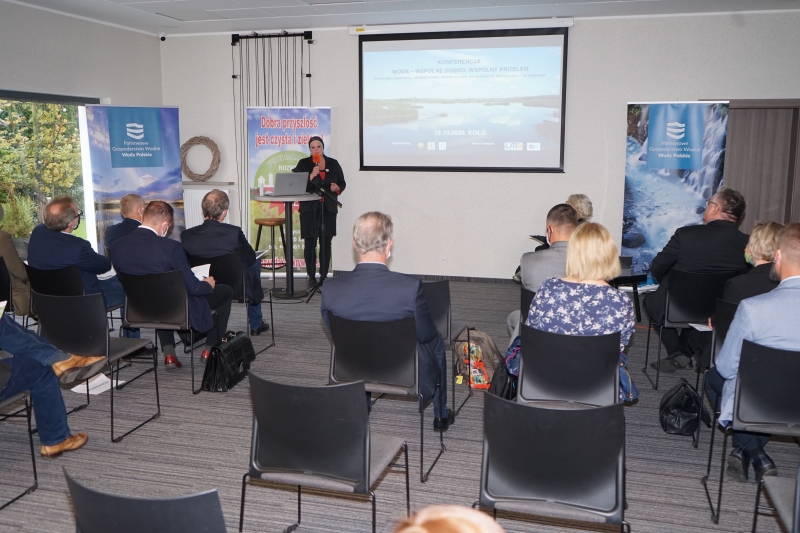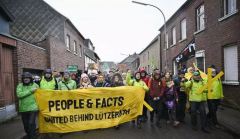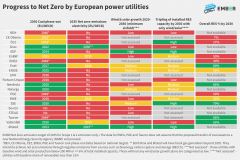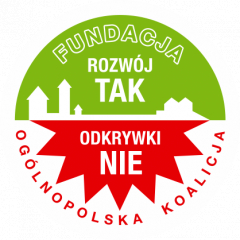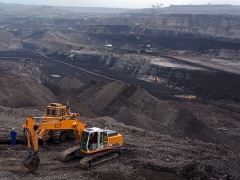Climate change, mining dehydration and drainage carried out over the years, combined with the natural, on the border of Eastern Wielkopolska and Kuyavia, scant rainfall, have brought the region to the brink of ecological disaster. The situation requires urgent and comprehensive action to stop the desertification of these areas. The gravity of the problem is understood by scientists, local government officials and specialists from institutions such as the Polish Waters and forest inspectorates, who jointly sought possible solutions during the conference 'Water - a common good, a common problem'.
On 13 October 2020, a conference was held in Koło, in order to address one of the most serious problems faced by the region leaving the mining industry - water shortages.
- A fair transformation should involve addressing economic, social, environmental and hydrological issues. The hydrological issues, which are most important in lignite mining regions, are not taken seriously enough. That is why we have concluded that this subject should be introduced into the entire strategy for a fair transformation of Eastern Wielkopolska and Kujawy. It is important for us that these aspects will be shown very strongly,' said Dr Miłosława Stępień from the Aktion Konin Association.
The conference participants made a clear diagnosis of the problem and fully agreed on the need for urgent action. It was pointed out that they must go beyond the 4 districts covered by the TPST (Territorial Plan for Equitable Transformation) and take into account the affected areas of the Kujawy Mountains affected by mining dehydration.
The main areas of action that will need to be taken are the following:
- "water" reclamation of the opencast areas,
- water retention (small and micro),
- the restoration of biodiversity,
- adaptation to climate change,
- education,
- coordination of the development and implementation of water restoration strategies - including raising funds.
A lot is happening, but little is heard about it
Polish waters, without waiting for the results of the talks which have been going on for years, have started to work and are carrying out investment activities to increase water retention in the catchment areas of the Wielkopolska-Kujawy border region. Bogumił Nowak, Director of the Regional Water Management Board in Poznań, spoke about their activities and first visible effects during the conference.
There is also one of the main responsible for the dramatic situation of water in the region, the owner of opencast lignite mines, ZE PAK. In agreement with the Polish Waters and local authorities, it aims to speed up the flooding of disused open castings. This will help reduce the impact of mining on the Wielkopolska Lake District.
Vice President of ZE PAK Paweł Markowski stated that the reason is not only the new green company strategy. First of all, it is about business issues - the longer the reclamation of open castings takes, the longer the company will pay very high taxes.
Who will take responsibility for the water restoration strategy?
- It is clear that we expect the coordination of actions concerning water strategies in the region to be assigned to one clearly defined entity," said Kuba Gogolewski from the "YES Development - Opencasting NO" Foundation at the meeting. However, most of the panellists were of the opinion that appointing new 'bodies' to coordinate the process, subsequent committees and teams, is not a goal. The RT-ON Foundation shares this opinion, however, in our opinion it is necessary to coordinate these processes at a level that will facilitate obtaining funds and ensure that none of the important activities are omitted. Moreover, the very identification of the need for coordination and the current lack of a clearly defined entity responsible for it requires this fact to be taken into account when applying for funding from the Fair Transition Fund in order to fill the gap.
Unfortunately, during the conference, none of the representatives of the entities operating in the Wielkopolska region expressed a desire to take on this role. It was suggested that this should be the task of the Polish Waters, which is the institution best essentaily prepared. However, the Director of the Regional Water Management Board in Poznań indicated that Polish Waters have no possibility to supervise activities carried out outside the waters, i.e. on agricultural land and land belonging to local governments, where there are extensive drainage systems. Activities in these areas are the responsibility of the relevant ministries, which, among others, develop crop subsidy systems.
Another obvious candidate seems to be the Marshal of the Voivodeship. In the transformation processes, his tasks are performed by the Regional Development Agency in Konin. The ARR declares its commitment to "water" issues, i.e. their inclusion in the TPST and other activities related to the transformation, but it will not take on a coordinating role and awaits ready strategies or projects from outside. Maciej Sytek, ARR Board Director explained that the ARR does not have sufficient competence in complex water issues.
Innovations in water management
Many innovative ideas on water management in the region were presented at the conference. Prof. Maciej Zalewski presented concepts in the field of ecohydrology, which can be successfully implemented in Eastern Wielkopolska and Kujawy.
- We have to parallely conduct the tasks that have been undertaken so far on a sectoral basis. And that did not work. Hydrologists, hydrotechnics have dealt with water, ecologists with biodiversity and someone else with the benefits for society. And ecohydrology creates a scientific basis explaining the complexity of processes, the hierarchy of importance of individual elements,it is a science that makes it possible to improve all elements," noted Professor Maciej Zalewski.
Bogumił Nowak, Director of RZGW in Poznań, talked about the idea of building photovoltaic farms to supply water pumping stations for flooding openings. The project fits closely with the concept of the Green Valley of Energy, and will reduce the operating costs of hydrotechnical equipment.
Professor Benedykt Peplinski pointed out that the main factor limiting agricultural production in the future will be water. He also showed that restoring proper hydrological conditions will contribute to the creation of over 1 400 additional jobs in the agri-food sector and in services for the people working there in the Eastern Wielkopolska region.
During the conference, the subject of closed-loop water management, ways of using drinking water and separating it from grey water also appeared. The President of the Management Board of the Regional Development Agency, Maciej Sytek, pointed out that it is necessary to start thinking about Wielkopolska as a water-deficit area and already act as in Israel, for example.
How to finance water activities?
Eastern Wielkopolska may become one of the largest Polish beneficiaries of the Fair Transition Fund. Thanks to the European Green Deal, at least 30% of the new EU budget is to be spent on climate change mitigation and adaptation. It is worth taking this opportunity to finance water activities throughout the subregion. This is an essential element of a successful transformation, as the speakers emphasised. Izabela Zygmunt from the CEE Bankwatch Network, on the other hand, explained that adaptation to climate change means, among other things, protecting water resources, retention, drought prevention and flood protection.
Zygmunt stressed that it is worth participating in consultations of EU programmes and making proposals and needs concerning water. The Regional Water Management Board in Poznań has already taken such steps and reported on the increase in retention in the catchment areas in the form of design fiches to the National Plan of Reconstruction.
A beneficial potential source of funding is also the new Life programme, under which 60% of EU funding and up to 35% co-financing from the National Fund for Environmental Protection and Water Management can be obtained. The funds can be used for pilot projects, research projects on adaptation to climate change - including water management. An example worth following is the 'Kampinos Swamps' project, which has increased retention, reduced the flooding of local villages and restored proper water relations in the natural habitats of the Park.
Joint actions
- Wise water management and restoring proper water relations is a great challenge, but also a great opportunity for the region," concludes Katarzyna Czupryniak from the Foundation "Development Yes - Discovery No".- We have lived to see a moment when all important institutions in the region appreciate the importance of the problem and want to contribute to solving it. A large number of actors is an additional difficulty. Therefore, an important task will be to coordinate the exchange of information and cooperation of the various actors in such a way as to obtain the necessary funds. At the same time, it is important to allow the greatest possible support for the actors active in this area and to ensure the greatest possible synergy of actions.



